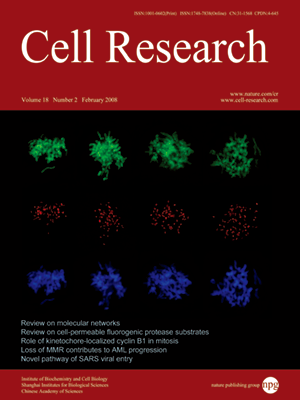
Volume 18, No 2, Feb 2008
ISSN: 1001-0602
EISSN: 1748-7838 2018
impact factor 17.848*
(Clarivate Analytics, 2019)
Volume 18 Issue 2, February 2008: 311-323
ORIGINAL ARTICLES
Protein kinase A suppresses the differentiation of 3T3-L1 preadipocytes
Fuqiang Li1, Dongmei Wang1, Yiran Zhou11, Bo Zhou1, Yanan Yang1, Hehua Chen1 and Jianguo Song1
1Laboratory of Molecular Cell Biology, Institute of Biochemistry and Cell Biology, Shanghai Institutes for Biological Sciences, Chinese Academy of Sciences, 320 Yueyang Road, Shanghai 200031, China
Correspondence: Jianguo Song(jgsong@sibs.ac.cn )
cAMP and protein kinase A (PKA) are widely known as signaling molecules that are important for the induction of adipogenesis. Here we show that a strong increase in the amount of cAMP inhibits the adipogenesis of 3T3-L1 fibroblast cells. Stimulation of PKA activity suppresses adipogenesis and, in contrast, inhibition of PKA activity markedly accelerates the adipogenic process. As adipogenesis progresses, there is a significant increase in the expression level of PKA regulatory subunits and a corresponding decrease in PKA activity. Moreover, treatment of 3T3-L1 cells with epidermal growth factor (EGF) stimulates PKA activity and blocks adipogenesis. Inhibition of PKA activity abolishes this suppressive effect of EGF on adipogenesis. Moreover, activation of PKA induces serine/threonine phosphorylation, reduces tyrosine phosphorylation of insulin receptor substrate 1 (IRS-1) and the association between PKA and IRS-1. Taken together, our study demonstrates that PKA has a pivotal role in the suppression of adipogenesis. cAMP at high concentrations can suppress adipogenesis through PKA activation. These findings could be important and useful for understanding the mechanisms of adipogenesis and the relevant physiological events.
Cell Research (2008) 18:311-323. doi: 10.1038/cr.2008.12; published online 15 January 2008
FULL TEXT | PDF
Browse 1911


